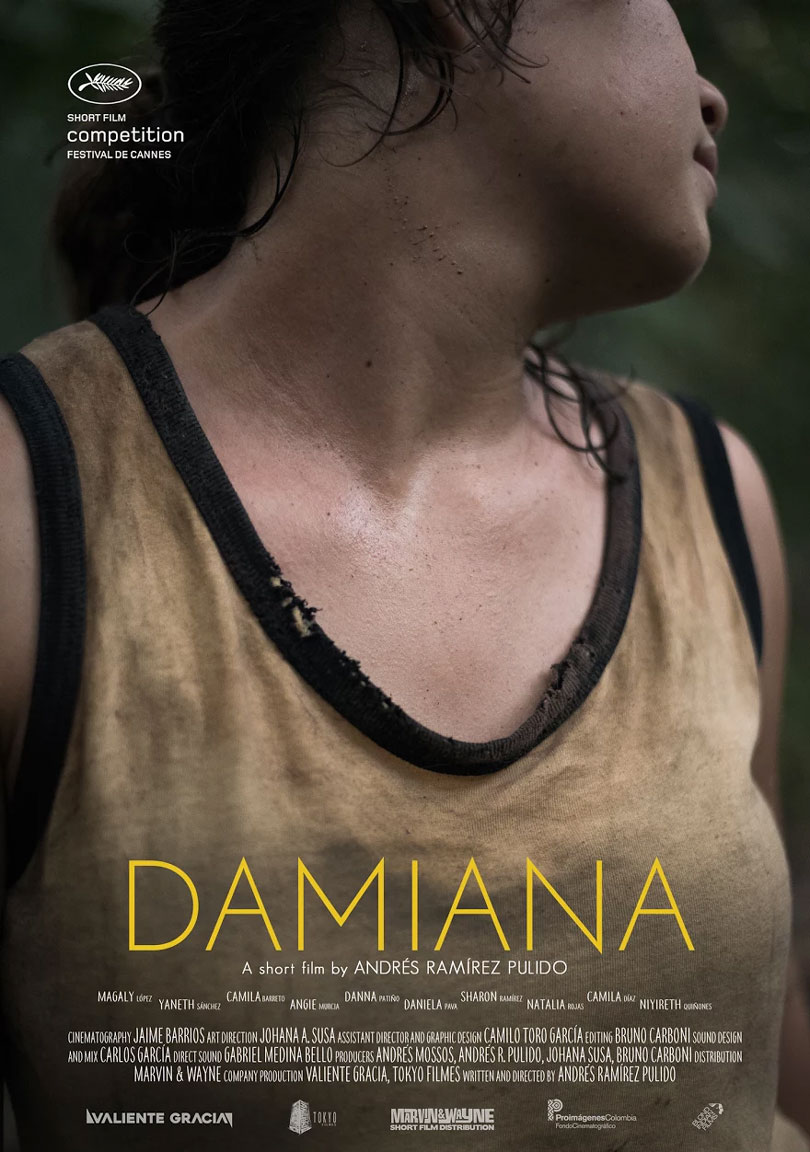Directed by Ramirez Pulido –
Deep inside the jungle, a group of teenage girls are being kept under supervision. Despite abandonment and hostility, Damiana hopes she can get in touch with her father.

GFM: For our readers who have not yet seen Damiana, could you please introduce the film and share some of your inspiration for the story?
Andrès: For the past few years, I have felt the desire to observe and portray adolescence in Tolima, the Colombian region where I currently live, especially those teenagers who have so deeply faced violence and abandonment. I happened to have had the opportunity to meet a group of girls who are being kept under surveillance in the middle of the jungle and this encounter led me to create this depiction of their everyday lives. Damiana was born there and the story is about a girl who is isolated in the jungle and who yearns to have contact with her father. I wanted to explore the intimate landscape of these teenage girls, who try to express their longings and fears through their bodies, the only thing that still belongs to them.

GFM: Natural environments appear to play an important role in your films, as seen in your previous award-winning short, El Edén, Damiana and the upcoming short documentary, Eliú. What attracts you to this setting and putting characters in environments which are far removed from the city?
Andrès: Well, natural environments are very important to me. They represent the hostility and the past, or the abandonment, that chases the characters. In El Edén, the place is loaded with a violent past that engulfs the characters. In Damiana, nature represents abandonment and absence. I think spaces are another character in my films. Natural environments are not strange to these adolescents either – these places are part of their daily lives. Some of the girls in Damiana remain in isolation in the middle of the tropical forest.
GFM: Could you discuss your focus on an all-female cast of pre-teen and teenage girls and your interest in exploring drug addiction at such a young age?
Andrès: The casting of all my films comprises non-actors. In Damiana I wanted to have an all-girls cast, whose lives and experiences were very similar to the history of the film. As previously mentioned, borne out of reality and I wanted to work with the same girls who had inspired the project.
It was not my intention to explore drug addiction at such a young age, although this is explored in the film. I am actually more interested in the causes behind this affliction, such as the aimlessness of adolescence and the emptiness after being abandoned by their parents, the desire to lead a different life which differed from those of their parents and issues around identity and rebelliousness.

GFM: Your lead actress gives an extremely strong performance and carries the film. How did you discover her and could you talk about your experience of working with her, especially as you took her through scenes where she is verbally abused by her counsellor?
Andrès: She’s actually in a surveillance programme for drug addiction, similar to the one in the movie. She’s not an actress. When I met her and talked to her I knew she had to be Damiana – her life is very close to the main character and for me this was fascinating. Working with her was an arduous process because in her own life she had experienced everything that happens in the film. This was the most difficult part of the process of making the film. We adapted to what was happening. However, she really did well when we started shooting. Finally, it was worth my perseverance. The scenes where she is verbally abused by her counsellor were inspired by moments and incidents that she had already lived through.
GFM: The counsellor’s hard-lined approach is difficult to witness and accept as an outsider. Was her behaviour simply a display of tough love or did you intend to expose something more problematic in Colombian society?
Andrès: The counsellor’s hard-lined approach is inspired by the treatment that many children have received in these centres – it’s not something that’s invented, but I wanted to emphasise it. I think it reflects the importance to rectify this approach as many children perhaps only need love and affection. It’s really a reflection of society in my country. The woman who plays the role of the counsellor isn’t an actress either and she really works as a minor’s counsellor.

GFM: What does it mean to you to be going to Cannes with your film In Competition for the Palme d’Or and what are you hoping to take away from your experience?
Andrès: Being at Cannes is a great achievement for my career as a director and it is a great opportunity to show the work of the whole crew. And I also hope to build alliances at the festival that will provide me with the opportunity to make other that I have in mind.

director Ramirez Pulido